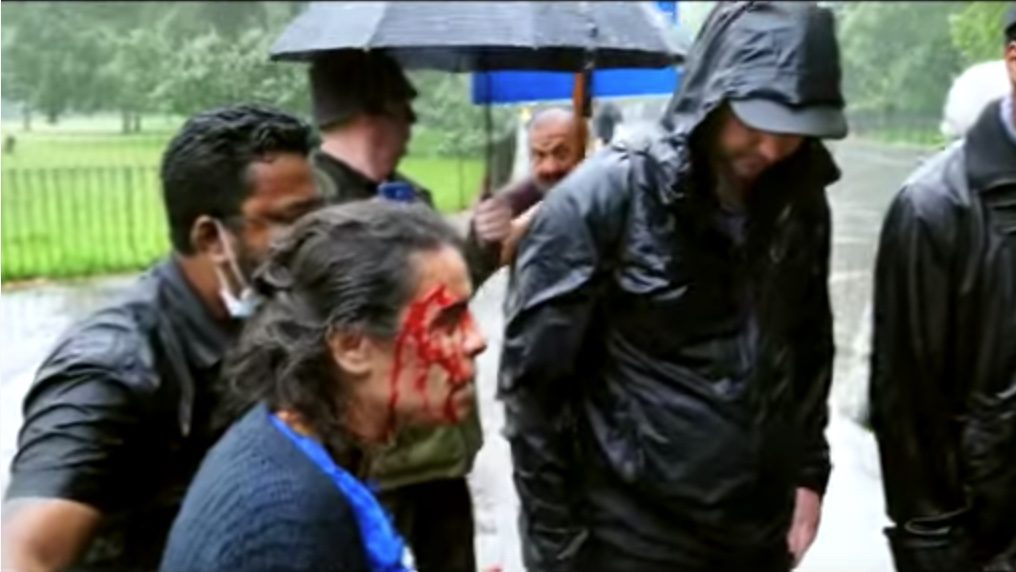
26 Jul The Word or the Sword? Christianity and Islam meet in Hyde Park
Last Sunday, on a rainy London day, Christian street preacher Hatun Tash was stabbed twice, an attacker’s blade striking her once in the forehead above her right eye and then on her wrist as she put her arms up to defend herself. This took place at Speaker’s Corner in Hyde Park.
Speaker’s Corner is a place where anyone can turn up, get up on a soap box, and deliver their message to whoever will listen. In recent decades this spot has become a place where Muslims and Christians Sunday by Sunday contest the relative merits and demerits of their religions. Hatun Tash, director of DCCI (Defend Christ, Critique Islam) Ministries is a regular there, taking the apologetic challenge to Muslims.
To be a Christian preacher to Muslims is no easy or light calling. Over the years Tash has been threatened with death and beaten, her bones broken. She has even been arrested by the London police.
The contest between Islam and Christianity is an ancient one. In the past several factors have favoured Islam’s successes against Christianity. One is Islam’s self-confident replacement theology, which sees itself as the rightful inheritor of Judaism and Christianity. Another factor is Islam’s inbuilt anti-Christian apologetic: the Qur’an has more to say about why Christianity is wrong than it does about Islam’s five pillars, so ordinary Muslims are taught objections to Christianity as part of the core of their faith. Another factor is the demeaning dhimma system, which subjugated Christians and other non-Muslims under Islamic rule, creating powerful social and economic incentives for the conquered to switch to the religion of their conquerors. The legacy of this system continues today. For example in Pakistan, whenever non-Muslims convert to Islam this is publicly celebrated, but when Muslims become Christians their lives are in danger from former friends, family and the authorities.
The Qur’an advocates two different responses to opposition. Early on it counseled excellence in disputation: “Call to the way of your Lord with wisdom and beautiful instruction, and discuss with them using a more excellent way.” (Sura 16:125). Later, however, the Qur’an called for violence, “fight them until there is no more fitna” (e.g. Sura 8:39, Sura 2:193) and “fitna is worse than killing” (Sura 2:217, 191). The word fitna originally meant ‘trial’ or ‘test’, but Muslim scholars came to interpret it more broadly to include even the mere existence of disbelief in or opposition to Islamic teachings.
There is also the personal example of Muhammad, who called upon his followers to kill individuals who had been speaking against him. In a very well-known and oft-quoted tradition, Muhammad advised Muslims, when they see an evil, to change it “with the hand”, or failing that, “with the tongue”, or failing that, to oppose it in one’s heart. In other words, to correct a wrong, Muslims should use force in preference to words
While each faith has its truth claims, and the Qur’an itself says “there is no compulsion in religion: the right course has become distinct from error” (Sura 2:256), Islam’s advance has undoubtedly been aided by the use of force. Of the five seats of the Christian patriarchs in the ancient Christian world, only Rome remains unconquered. The others, Constantinople, Antioch, Jerusalem and Alexandria, all fell to the sword of Islam.
A recent study, “Paradoxes of Pluralism, Privilege, and Persecution: Explaining Christian Growth and Decline Worldwide” published in Sociology of Religion found that where Christianity enjoys official support from governments, it tends to be in decline. On the other hand, authors Nilay Saiya and Stuti Manchanda found that in pluralistic societies, where religious identities can freely complete, Christianity often advances. It also is flourishing in a number of countries where Christians are persecuted. They conclude that privilege and state support is ‘the greatest threat to growth in Christianity’. This insight would not come as a surprise to many Christians.
At five foot two, Hatun Tash is not physically imposing. All the same, she is one of the most fearless critics of Islam in the world today. This puts her life at risk on the streets of London. The video shows the assailant stabbing her in the face with considerable force, so she was fortunate that she received only a ‘minor slash’, as the Metropolitan Police put it.
On Sunday, soon after she was stabbed, Hatun Tash fainted, but when she came to she immediately got to her feet and began preaching loudly to the Muslims present, saying, “Essential for you to remember, dear Muslim people! Dear Muslim people, Lord Jesus doesn’t need men. Allah is in need of you for to be god. Allah cannot do without you. Your prophet cannot live without you. Cutting people’s eyes is not going to help you.” Then Tash called upon Muslims to repent and turn to Jesus. Tash’s point was that only a weak god needs the help of violent human hands to win arguments.
Can Islam regain its former glory and power in the world through violence? The jihadis say “Yes it can!” Renowned Islamist preacher Sayyid Abul A’la Maududi put it like this in Let Us Be Muslims: “So I say to you: if you really want to root out corruption now so widespread on God’s earth, stand up and fight against corrupt rule; take power and use it on God’s behalf. It is useless to think you change things by preaching alone.”
However, as Hatun Tash pointed out, to resort to violence can also be taken as a weakness, suggesting the failure of reason and argument to support Islam’s claims. The question is, will Muslims be persuaded by Maududi’s logic or by Tash’s?
Mark Durie is the founding director of the Institute for Spiritual Awareness, a Fellow at the Middle East Forum, and a Senior Research Fellow of the Arthur Jeffery Centre for the Study of Islam at the Melbourne School of Theology.



ISAAC IBITEYE
Posted at 16:27h, 27 JulyGood Piece, thanks for the eye opener, I love the fact that I am a Christian the more
Ian Hore-Lacy
Posted at 17:29h, 27 JulySome very helpful points in para 4 especially!
Natalia
Posted at 12:53h, 28 JulyThank you for this post. Hatun’s point struck ke: “Only a weak god needs the help of violent human hands to win arguments” Praying for her.
Choan-leang Lee
Posted at 17:10h, 30 JulyThank you for giving us a Christian example on how to respond to persecution. God bless you Dr/Pastor Mark.
Paul T
Posted at 10:48h, 26 February‘about why Christianity is wrong that it does about Islam’s five pillars’ should be ‘than’
Mark Durie
Posted at 08:46h, 09 MarchThanks for that catch!